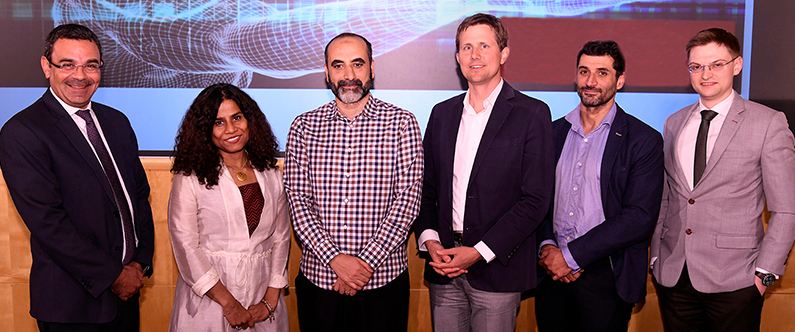WCM-Q event explores law and ethics of genetic medicine
 From left: Dr. Khaled Machaca, Dr. Sunanda Holmes, Dr. Mohammed Ghaly, Dr. Jeffrey Skopek, Dr. Jeremie Arash Rafii Tabrizi and Dr. Barry Solaiman.
From left: Dr. Khaled Machaca, Dr. Sunanda Holmes, Dr. Mohammed Ghaly, Dr. Jeffrey Skopek, Dr. Jeremie Arash Rafii Tabrizi and Dr. Barry Solaiman.
Doctors, lawyers, ethicists and academics convened at Weill Cornell Medicine-Qatar (WCM-Q) to discuss the legal and ethical implications of new gene editing technologies that allow for the creation of ‘genetically enhanced humans’.
The event, the latest in WCM-Q’s Intersection of Law & Medicine series, featured lectures and panel discussions of pressing issues prompted by the recent development of technologies such as CRISPR, a powerful gene editing tool that a scientist in China claims to have already used to produce twin baby girls with modified genes that make them resistant to HIV.
Co-ordinated by WCM-Q’s Division of Continuing Professional Development in collaboration with Hamad Bin Khalifa University (HBKU), the event heard lectures from practicing physicians, lawyers, legal academics, researchers and ethicists.
Dr. Barry Solaiman, assistant professor at HBKU College of Law and Public Policy, and co-director of the activity, explained the existing legal framework governing genetics research in Qatar and discussed the challenges involved in developing regulations to take account of developments in gene editing technologies.
Dr. Sunanda Holmes, general counsel and chief compliance officer at The American University in Cairo, spoke about the global legal frameworks governing gene editing and genetic medicine in general, with specific reference to the USA, UK and Canada. WCM-Q’s Dr. Jeremie Arash Rafii Tabrizi, professor of genetic medicine in obstetrics and gynecology, spoke about the possible uses for genetic technologies like CRISPR, such as introducing genetically modified mosquitos to combat the spread of malaria, and genetic therapies for breast cancer caused by mutations in two genes known as BRCA1 and BRCA2.
Dr. Tabrizi said: “If you have a BRCA mutation, you have a very high risk of cancer, so we do a mastectomy. What’s going to happen within the next few years, I think - and we are working on this in our labs - is to design a personalized CRISPR to correct this mutation with a few cycles of injections in the breast, rather than a mastectomy.”
Dr. Tabrizi warned that regulation of gene editing poses many problems, explaining that so-called biohackers are already selling DIY CRISPR kits online. Regulation of genetically modified plants and animals is also problematic, because once introduced into the wider environment they are difficult or even impossible to control, he said.
HBKU College of Law dean Susan L. Karamanian, who attended the conference, said: “HBKU Law was delighted to work with our Education City neighbor, WCM-Q, to address a complex topic that involves novel legal issues. The conference brought together leading thinkers in law, Islamic studies, ethics, medicine and scientific research to help identify the legal gaps and pave a way forward.”
Dr. Jeffrey Skopek, lecturer in medical law, ethics and policy at the University of Cambridge, gave a lecture titled ‘The Harms of Human Genetic Enhancement: Secular Perspective’, after which Dr. Mohammed Ghaly, professor of Islam and biomedical ethics at the HBKU Research Center for Islamic Legislation & Ethics, spoke about Islamic ethical perspectives on human gene editing.
Dr. Solaiman said: “This was an excellent opportunity for HBKU Law to collaborate with WCM-Q on cutting edge issues surrounding the science, law and ethics of genetics research. Qatar is quickly developing capacity in this area and it is critical that academic institutions work together to support this development. In this regard, the gathering of experts from inside and outside Qatar highlighted the issues that must be given new or continued focus for continued progress.”
The event culminated with a panel discussion in which all of the speakers explored the challenges of developing a legal and ethical framework in Qatar to regulate gene editing to protect the rights and dignity of both individuals and society at large. WCM-Q’s Dr. Khaled Machaca, associate dean for research, gave the closing remarks.
Dr. Thurayya Arayssi, senior associate dean for medical education and continuing professional development, who co-directed the event with Dr. Solaiman, said: “Gene editing is one of the most exciting areas of medical research with huge potential for treating many different diseases, as well as many other possible applications. We are very grateful to our expert speakers for joining us to explore ways to regulate genetic medicine that not only provides the very best care to patients but also offers robust protections for patients and the wider community. Special thanks go to Dr. Barry Solaiman, whose expertise and energy were crucial to the success of this event.”
The event, titled ‘Intersection of Law and Medicine Series: Genetically Enhanced Humans’, was accredited locally by the Qatar Council for Healthcare Practitioners-Accreditation Department (QCHP-AD) and internationally by the Accreditation Council for Continuing Medical Education (ACCME).